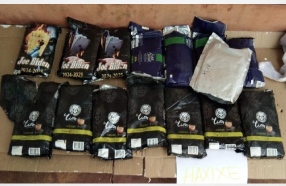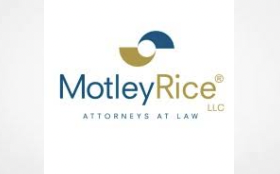Bloomberg Law
At first, a North Dakota judge’s ruling that a drug cartel should pay $4.6 billion to relatives of nine Americans murdered in Mexico looked largely symbolic.
But lawyers representing the victims’ families have adopted an unusual and exhaustive strategy to collect from the Juarez cartel since the decision two years ago.
They’ve blanketed US district courts with more than 1,200 claims against cash and assets US agents have seized from drug dealers and others with suspected ties to the Mexican traffickers.
The barrage of claims, which has not been previously reported, targets seizures ranging from $1,779 confiscated at the Arizona border to $6 million in money laundering proceeds collected by federal prosecutors in New York.
The law firm representing the families, Motley Rice, declined to discuss the cases, as have the Justice Department attorneys opposing their claims. Both sides’ arguments are laid out within the court filings.
The claimants see the New York case in particular as an opportunity for courts to reframe the application of the Terrorism Risk Insurance Act, a law passed after 9/11 to compensate victims of terrorism.
The cases also have the potential to bring new scrutiny to the scope and purpose of federal forfeiture laws, which have empowered the government to seize billions of dollars in cash and assets from drug traffickers and other criminals over the last few decades. Some of the money goes to crime victims; uncontested assets also typically fund law enforcement initiatives and community programs such as drug treatment and prevention.
And the sheer volume of claims filed by Motley Rice suggests an effort to entice multiple judges to entertain their arguments in the hopes that conflicting decisions force a review by higher courts.
“Appellate courts that have looked at these issues have ruled for the government, but the US Supreme Court has not yet spoken on the issues that Motley Rice present,” said Louis Rulli, a University of Pennsylvania professor who specializes in forfeiture law.
Other forfeiture lawyers say Motley Rice faces an uphill battle. The US government disputes that the firm’s clients have a right to the seized cash, or even that some of it can be traced to the Juarez cartel.
Courts have also consistently required claimants in forfeiture matters to prove a clear connection between the money they seek and the underlying offense—in this case, the 2019 murders of three women and six children in Sonora, Mexico.
“The law was set up to protect the rights of bona fide owners of property. But it’s not a liquidation proceeding,” said Stefan Cassella, a former federal prosecutor who runs a consulting firm specializing in asset forfeiture law. “It’s not an opportunity for everybody to come in and say, ‘I don’t like that guy, he owes me money.’ ”
A Track Record
Motley Rice is no stranger to going after financiers of terrorist attacks. The firm has represented victims of the 9/11 attacks, suicide bombings, and the Oct. 7 attack in Israel. It also pursued cases against big tobacco companies in the 1990s, an effort culminating in a settlement worth more than $200 billion.
The 2019 murder victims were members of an offshoot Mormon community in Mexico that had publicly protested the cartel’s activities. The women—Maria Rhonita LeBaron, Christina Langford, Dawna Ray—and their children had dual US and Mexican citizenship.
The group was en route that November to meet up with the families’ fathers— two in the US and another in Mexico—when one of their three vehicles had car trouble and the others went in search of help.
On a mountainous stretch nearly 70 miles south of the US border, they were ambushed by members of the cartel’s La Linea wing, a ruthlessly violent squad dispatched for years to carry out public acts of terror and force communities into submission.
It’s not clear whether the families were targeted. Confidential informants and witnesses allegedly told the FBI that the Juarez soldiers had been looking for rivals from another drug gang when they took control of the roads.
Still, they fired hundreds of bullets into the families’ vehicles and set one afire with the occupants inside. Five of the the victims burned to death, including 8-month-old twins Titus and Tiana Miller, medical examiners later determined. The other four died from gunshots.
Several children escaped the scene, including a 13-year-old who walked 10 miles to get help.
Mexican authorities have arrested at least a dozen suspects in the ensuing years and charged them with crimes, including being part of the wider criminal organization.
Months after the killings, the widowers and legal guardians of the surviving children sued the cartel in North Dakota, where the fathers had been living and working.
The 51-page complaint named a singular defendant, “the Juarez cartel,” and outlined its long history of narco-terrorism and graphic details about La Linea and the murders. It argued the cartel was liable for the deaths under US laws, including one banning international terrorism.
No one from the trafficking ring, including any lawyer, responded to the complaint or showed up in court.
After a weeklong trial that included grisly testimony about the killings, US Magistrate Judge Clare Hochhalter in June 2022 awarded the families more than $1.5 billion in damages, a sum automatically tripled under federal anti-terrorism laws.
More than a year passed before Motley Rice, citing the unpaid judgment against the cartel, began filing motions to intervene in forfeiture cases nationwide.
In a court reply to one, prosecutors noted the firm had filed claims “in more than 700” nonjudicial forfeiture proceedings initiated by the DEA and Customs and Border Protection.
They attached a list that suggested the claimants’ lawyers targeted every seizure they could identify, and that federal drug agents were confiscating millions of dollars from possible cartel associates each week. For example, the list shows the DEA collected more than $3.5 million in 26 cash seizures on a single day, May 25, 2023, in amounts ranging from $4,980 to $412,475.
Since then, the list of claims has grown to more than 1,200.
A Potential Test Case
The DEA alone seized more than $190 million worth of assets in the last fiscal year alone, its records show.
Most forfeitures go uncontested and require no court hearing, particularly if the value of the seized asset is less than $500,000. But the amount at stake in the New York money laundering case made it ripe for a challenge.
In their 2021 indictment, prosecutors alleged that the ring, led by California resident Ying Sun, had laundered $28 million for drug traffickers in Mexico and the US. Sun pleaded guilty and was sentenced last June to 32 months in prison. Prosecutors ultimately seized about $6 million.
In August, Motley Rice filed a claim seeking about half that amount for the families. Its petition, signed by attorney Michael Elsner, who works in the firm’s anti-terrorism and human rights practice, argued that the Terrorism Risk Insurance Act gives the victims “the right to execute or attach their judgment against the assets of the defendant (Juarez Cartel) and/or the assets of any agency or instrumentality of the Juarez Cartel.”
The petition said the money laundering ring was such an instrument of the cartel, and requested a hearing on the validity of its claim.
Prosecutors pushed back on several fronts. The families’ petition didn’t establish their rights and ties to the forfeited assets and “failed to plausibly link” the cartel with the money that had been seized, Assistant US Attorneys Tara M. La Morte, Matthew Shahabian and Jonathan Bodansky wrote.
The “only question before the court” was whether the claimants even had legal standing to intervene in the matter, their reply said. “The unconditional answer is no.”
US District Judge Sidney Stein has not yet ruled on the claims.
Cassella, the former federal prosecutor, said similar legal arguments have failed before.
In 2023, the US Court of Appeals for the DC circuit ruled against an attempt by the families of those killed in a 2001 Hamas suicide bombing in downtown Jerusalem to try and get funds held by the government after it seized the M/T Achilleas, an oil tanker carrying Iranian crude oil worth nearly $100 million.
Victims’ families in that case held judgments against the Islamic Republic of Iran worth about $1 billion. The blast in Jerusalem killed 15 people, and because Iran provided “material support” to Hamas, the families made the argument that they were entitled to the money.
Eric Honig, another former federal prosecutor who now practices forfeiture law, said Motley Rice’s legal tactic was novel, but questioned its viability.
“There’s no real provision of law for them,” Honig added. “They’re not an owner and not a lien holder and not the victim of the specific crime that the persons were convicted of.”
The claimants, however, might have a loftier goal than just collecting the judgment, said Rulli, the Penn professor.
“Another possibility in their strategy is they want to raise the visibility of this issue,” he said. That would put pressure on the Justice Department, or lawmakers, to compensate the victims’ families because the federal government brings in billions of dollars through forfeiture, he said.
“And, of course, that might also be putting pressure ultimately on Congress if they’re unsuccessful in the courts,” Rulli said.

















